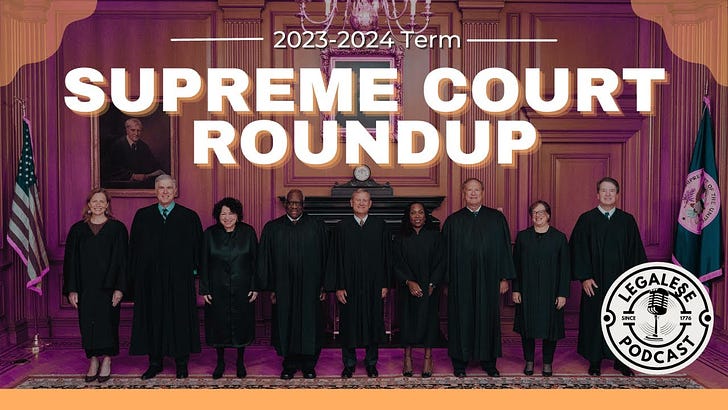Show Notes - Devillier v. Texas Wrap Up
Full Transcript - Devillier v. Texas Wrap Up
Today on Legalese, we will be wrapping up the Supreme Court case of Devillier v Texas and discussing the Court’s holding that Devillier was entitled to seek just compensation under the Takings clause when the State of Texas flooded his property. Greetings and welcome back to Legalese….
Description
Episode #85
Case Background
Richie DeVillier lives on the same patch of Texas land where his father was born. His cattle ranch outside of Houston has been in his family since his great-grandfather—“Skunk” DeVillier—homesteaded the land back in the 1920s. His house is on DeVillier Road. You get the picture: He has roots.
And, for all the time his family has worked this land, it hasn’t flooded. There has been rain—outside of Houston, there’s plenty of rain—but water flowed naturally south into the Gulf of Mexico.
That all changed a few years ago when the Texas Department of Transportation renovated IH-10, the highway that runs just south of Richie’s ranch. The state raised the highway, but it also installed a three-foot-high, watertight concrete barrier all along the middle of it—basically a dam.
When Hurricane Harvey hit the area in 2017, the dam worked. Richie’s land—along with his neighbors’ land as far as the eye could see—spent days submerged in feet of water that could not get past the wall in the middle of the highway. Animals died. Trees died. The area was devastated.
Then, when Tropical Storm Imelda came a couple years later, the same thing happened again—the same flood, at the same level, held back by the same dam. The problem wasn’t the rain; there had always been rain in the area. The problem was that Texas’s dam was turning all the land north of the highway into a lake any time there was significant rainfall.
And so Richie and his neighbors sued. Texas can, if it needs to, turn a ranch into a lake, but the Takings Clause of the Constitution says it cannot do so without paying for the land.
But then Richie’s case took a strange turn. It was true, Texas admitted, that the Takings Clause requires the government to pay for land it takes (which includes land it makes unusable by, say, recurrent flooding). But Congress has never passed a statute commanding Texas to obey the Fifth Amendment—and, at least according to Texas, that means the state doesn’t have to.
Amazingly, the 5th U.S. Circuit Court of Appeals agreed. In the wake of the Civil War, Congress adopted a law that allows people to sue cities and individuals who violate their rights, but that law doesn’t say anything about lawsuits against states. And that means that, for Texas, paying just compensation is optional. That rule is both dangerous and wrong. True, Congress never passed a law commanding Texas to follow the Constitution, but the Constitution itself commands Texas to follow the Constitution. That is why Richie has teamed up with IJ to ask the United States Supreme Court to clarify that the Constitution isn’t just a good idea—it’s the law. And states have to follow it, even when they don’t want to.
“There is not an asterisk next to the Fifth Amendment that says the government doesn’t have to pay just compensation if it doesn’t want to, the Supreme Court has repeatedly affirmed Americans’ right to just compensation is an inherent part of the Constitution. It cannot be ignored or circumvented by the government or the courts.”
~Institute for Justice Senior Attorney Robert McNamara
[Originally Published In The Institute For Justice’s Devillier v. Texas Press Release]
The Opinion Of The Court
The Court did not resolve the question presented because the case’s underlying premise was incorrect; the property owners adversely affected by the flood evacuation barrier constructed by Texas should be permitted on remand to pursue their Takings Clause claims through the cause of action available under Texas law. Justice Clarence Thomas authored the unanimous opinion of the Court.
The Fifth Amendment's Takings Clause guarantees the right to just compensation when the government takes private property for public use, but the Supreme Court has never clearly held that the Takings Clause itself creates a private cause of action for damages.
However, the Court did not need to resolve this question because the case’s underlying premise—that the property owner had no cause of action to seek just compensation—was incorrect. Texas state law provides an inverse-condemnation cause of action that property owners can use to bring takings claims under both the Texas Constitution and the U.S. Constitution’s Takings Clause. The state assured the Court that it would not oppose any attempt by the property owners to amend their complaint to pursue this state-law cause of action. Therefore, since the property owners have an available avenue to seek just compensation, the Court remanded the case to allow them to pursue their Takings Clause claims through the Texas inverse-condemnation cause of action.
It is unfortunate the Court would remand the case on what Justice Thomas’ majority opinion would call ‘a good faith assumption that Texas would not oppose any attempt by Devillier and the other petitioners to seek a takings claim under the state-law cause of action’— as the whole reason this case went to the Supreme Court in the first place were the actions Texas took against Devillier in bad faith, in an attempt to squirm their way out of their obligation to provide just compensation.
In their brief and at oral arguments, Texas would say that if Devillier felt wronged he should have brought a claim in a Texas state court under that State’s cause of action for an inverse condemnation takings claim. But Richie Devillier and the other 120+ parties to the case DID bring their case in a Texas state court under Texas’ inverse condemnation cause of action—At which point Texas used 28 USC §1441 to remove the case to federal court before it had even been heard by that Texas state court.
That said, this case did reverse the terrible Fifth Circuit opinion that dismissed this case out of hand, and also provided perhaps the Court’s cleanest statement about the principle of constitutional law known as the sword/shield dichotomy. Those outcomes are both notable and commendable. It would have been nice if the Court would have affirmed the “self-executing character” of the Takings Clause. A point they have mentioned in past cases such as Knick and First English:
“Because of "the self-executing character" of the Takings Clause "with respect to compensation," a property owner has a constitutional claim for just compensation at the time of the taking. Ibid. (quoting 6 P. Nichols, Eminent Domain § 25.41 (3d rev. ed. 1972)). ”
~Knick v. Township of Scott, 139 S. Ct. 2162, 2171 (2019)
While Texas will most likely hold to their agreement that they will allow this specific case to proceed in a Texas State Court, there is nothing preventing them, or any other State for that matter, from weaponizing §1441 to remove takings cases from State Court, only to turn around and say there is no federal cause of action—and therefore no obligation to provide just compensation.
Links
DeVillier v. Texas, 601 U.S. ___ (2024)
Other Resources
Related Cases and Laws
Knick v. Township of Scott, 139 S. Ct. 2162, 204 L. Ed. 2d 558 (2019)
First Lutheran Church v. Los Angeles County, 482 U.S. 304, 107 S. Ct. 2378 (1987)
Bivens v. Six Unknown Fed. Narcotics Agents, 403 U.S. 388, 91 S. Ct. 1999 (1971)
42 U.S. Code § 1983 - Civil action for deprivation of rights
Sword-Shield Dichotomy
Past Episodes
Subscribe to the Legale§e Newsletter You will get notifications for all new content, whether it’s articles, podcasts or videos!
Visit the Legale§e Podcast homepage to learn more about the show, get updates, contact me, buy my book, find links to my social media & more!
Follow
Support
BUY MY NEW BOOK
Constitutional Sleight Of Hand: An explicit history of implied powers Now Available on Amazon










